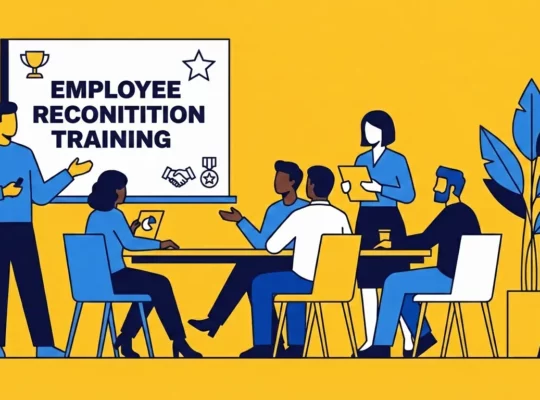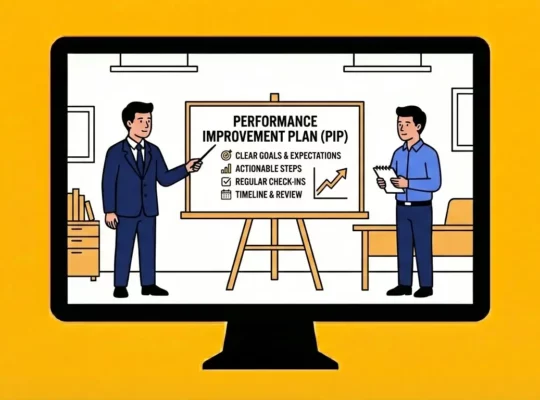The annual evaluation of an employee is a key moment in the life of a company. It allows you to take stock of the employee’s skills, set goals for the coming year, and discuss career progression. It is therefore essential to understand the conduct of this interview and its effects on the employee as well as on the company.
The importance of annual maintenance
The annual interview is a rite of passage for any employee. This moment of exchange between the employer and the employee offers the opportunity to take stock of the past year. It is not only about assessing skills and performance, discussing expectations and goals for the coming year. But also to know if the employee feels good in the company and if they integrate into the culture of the company.
This interview also offers a privileged moment to address topics often set aside daily, such as the employee’s professional aspirations or the prospects for development within the company. This is also the time for the employer to give constructive feedback and acknowledge the work done.
Preparation for the individual interview
Preparing for the annual interview is a crucial moment. For the employer, it is a question of gathering all the necessary data to draw up a complete balance sheet for the past year. These may be the objectives set during the previous interview, the missions entrusted, the training followed… Everything must be reviewed to establish an accurate and objective assessment.
For his part, the employee must also prepare. It can be interesting to take stock of your tasks, achievements, and difficulties encountered. They can also think about their goals for the coming year and the means to achieve them.
The conduct of the annual interview
During the annual interview, several points are usually discussed. The employer often begins by taking stock of the past year. They also discuss the objectives set and how they were achieved or not.
Then, the employee is invited to speak. They can talk about their tasks, their achievements, but also the difficulties encountered. It is also a time for them to share their career aspirations and discuss career prospects.
Finally, the employer and the employee set objectives together for the coming year. They can also discuss the training or support needed to achieve them.
The effects of the annual evaluation
The annual evaluation has effects on both the employee and the company. For the employee, it can help improve their performance and develop their skills. It also strengthens the relationship with the employer and clarifies the expectations of each party.
For the company, the annual evaluation makes it possible to better know its employees and to identify their strengths and areas for improvement. It also offers a global vision of available skills and training needs. It also helps build employee loyalty.
Rights and obligations during the annual interview
Even if annual maintenance is not legally mandatory, many companies set it up to ensure regular monitoring of their employees. The employer has the right to summon the employee to an annual interview but must respect certain rules, such as not discriminating between employees or ensuring the confidentiality of the information exchanged.
For his part, the employee has the right to be evaluated objectively and constructively. They also have the right to access information concerning them and to rectify it if necessary.
Being evaluated annually is an enriching experience, allowing each employee to take stock of their skills and objectives. As for the employer, they can better understand the needs of their employees and adapt their strategies accordingly.
Annual evaluation techniques
The annual interview is an evaluation process that can be implemented in different ways depending on the company and the position. There are many assessment tools and techniques that can be used to assess the skills and performance of each employee.
One of the most common methods is the evaluation grid. It is usually based on a list of skills or performance criteria that the employee must achieve. Each item is scored, usually on a scale of 1 to 5, which provides a quantified assessment. This technique is appreciated for its simplicity and transparency.
Another evaluation technique is 360 degrees. It consists of collecting the opinions of different people (superiors, colleagues, subordinates) to have a more complete view of the employee’s performance. This method is particularly useful for assessing relational and managerial skills.
Finally, objective-based evaluation is another widespread technique. It consists of setting specific and measurable objectives and then assessing the extent to which they have been achieved. This method is motivating for the employee who sees concretely the fruit of their efforts.
The effects of annual maintenance on the company
Beyond the evaluation of skills and performance, the annual interview has a significant impact on the company. Indeed, it contributes to the management of human resources by identifying the talents, training needs, and career aspirations of each employee.
The annual interview also strengthens the dialogue between employer and employee. It is a privileged moment of exchange where everyone can express themselves and be listened to. This helps improve the social climate of the company and strengthens the motivation of employees.
Finally, the annual evaluation is a strategic management tool for the company. It makes it possible to identify the strengths and weaknesses of the organization and to adapt the strategy accordingly. For example, if a certain number of employees express their wish to train in a specific field, the company may decide to invest in this training to develop its internal skills.
Data confidentiality during the annual interview
The annual interview involves the processing of sensitive personal data. The Labour Code stipulates that this information must be treated with the utmost confidentiality. The employer must ensure that only authorized people have access to this information and that it is used appropriately.
It is also important to remember that the employee has the right to access, rectify, or delete their personal data. It is therefore necessary to ensure that these rights are respected and that the employee is informed of how their data is used.
In short, holding annual interviews is a beneficial practice for both the employer and the employee. It is an opportunity for everyone to take stock of the past year, set goals for the coming year, and discuss prospects. It is also a privileged moment of exchange that helps strengthen the link between employer and employee.
Conclusion
The annual interview is a key step in an employee’s professional life. Properly conducted, it allows you to assess skills, set objectives, plan training and discuss development prospects, as well as give your opinion on the company. For the company, it is a strategic management tool that identifies talent and training needs, improves the social climate, and strengthens employee motivation. Despite certain legal and ethical constraints, annual maintenance remains a largely beneficial practice for all stakeholders. However, it must be ensured that it is carried out in a fair, respectful, and transparent manner.





